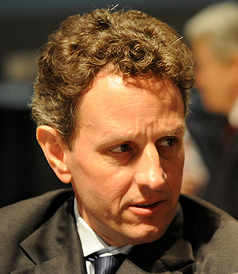
Washington – The Obama administration is sticking with plans to allow temporary tax cuts for the wealthiest Americans to expire this year and is open to discussing reductions in corporate tax rates next year, Treasury Secretary Timothy Geithner said Thursday.
The temporary tax cuts that passed in 2001 and 2003 during the Bush administration are set to expire at year’s end, and a battle is brewing over whether to renew them. Republicans want to make all the cuts permanent, but they haven’t said how they’d pay for this in an era of record federal budget deficits.
Budget analysts warn that President Barack Obama’s plan to retain most of the so-called middle-class tax cuts also would leave in place most of the costs associated with the Bush tax reductions.
Adding to the debate, three Democratic senators this week announced opposition to allowing higher taxes on wealthy Americans to take effect Jan. 1 amid a soft economic recovery.
Speaking at a breakfast with reporters hosted by The Christian Science Monitor, Geithner said the president’s plan to raise taxes on the wealthiest Americans remained unchanged.
“That will help us begin the process of beginning to bring down our long-term deficits, and we think that is the sensible long-term approach going forward,” he said.
At least three moderate Democrats, including Nebraska’s Sen. Ben Nelson, want the economic recovery to gather steam before tinkering with the tax code.
“He supports extending the expiring tax cuts at least until the economy is clearly recovering,” said Jake Thompson, a spokesman. “Senator Nelson also says (that) extending the tax cuts should be paid for as much as possible, and he would like to see more effort to do so than there was in extending unemployment benefits.”
This week’s Senate passage of an extension of jobless benefits was held up for weeks, in part because of political gamesmanship and disputes over how to pay for the additional $33 billion in government spending.
Indiana Sen. Evan Bayh and North Dakota Sen. Kent Conrad also have come out in opposition to allowing the tax reductions to expire and increasing tax rates for the wealthy.
“Senator Conrad is in favor of extending all the expiring tax cuts for now. However, after the economic recovery has solidified, in approximately 18-24 months, he believes the Bush tax cuts for the wealthy — not the middle class — should be sunsetted in an effort to address the nation’s deficit and debt,” said Sean Neary, a spokesman.
While the early congressional debate seems headed toward a one-year extension of most, if not all, of the Bush-era tax cuts, perhaps with a retroactive application of the taxes on the wealthy, a bigger fight looms.
Independent journalism is important. Click here to get Truthout stories sent to your email.
Investors increasingly are demanding a plan to shore up the government’s balance sheet amid soaring budget deficits. Absent that, the United States could find it more expensive to borrow to finance those deficits. Perhaps someday, the U.S. government could even see the kind of rejection by lenders that some European governments now face because of their deficits.
The nonpartisan Congressional Budget Office said earlier this year that extending the original Bush-era tax reductions would increase budget deficits by $2.56 trillion during this decade. As it stands, deficits under Obama’s budget plan are expected to total about $9.75 trillion over the next 10 years.
Geithner also acknowledged growing pressure to look anew at the corporate tax code. Obama has said he’s open to cutting the rate, which now is staggered and flattens at 35 percent for the largest firms.
“I think we are likely to have to take a broader look at corporate tax reform next year,” the Treasury chief said.
He wasn’t entirely sympathetic to the idea, however.
“It’s worth noting that the effective tax rate in corporate America is about at the global average. And U.S. firms are doing very well competitively, competing around the world even with the somewhat special features of our corporate tax code. But that is something I think worthwhile to take a look at,” Geithner said.
Tax issues featured in Thursday’s semiannual congressional testimony by Federal Reserve Chairman Ben Bernanke. During his appearance before the House Financial Services Committee, lawmakers tried to get him to bless their views on taxes and deficits.
Treading carefully, he said Democrats were right to continue government spending to spark the economy amid a deep downturn. However, he said, they must signal how they’ll reduce deficits.
“Although the deficit is very high, it is probably necessary to support the current recovery,” Bernanke said, calling for tough deficit-reduction measures from 2013 to 2020 that could be adopted now to give investors clarity and certainty.
Pressed on whether he favors tax cuts to stimulate economic activity, Bernanke, a Bush-era appointee, reminded lawmakers of the problem of paying for them.
“If you extend the tax cuts, you have to find other ways to offset them,” he said.
Join us in defending the truth before it’s too late
The future of independent journalism is uncertain, and the consequences of losing it are too grave to ignore. To ensure Truthout remains safe, strong, and free, we need to raise $43,000 in the next 6 days. Every dollar raised goes directly toward the costs of producing news you can trust.
Please give what you can — because by supporting us with a tax-deductible donation, you’re not just preserving a source of news, you’re helping to safeguard what’s left of our democracy.